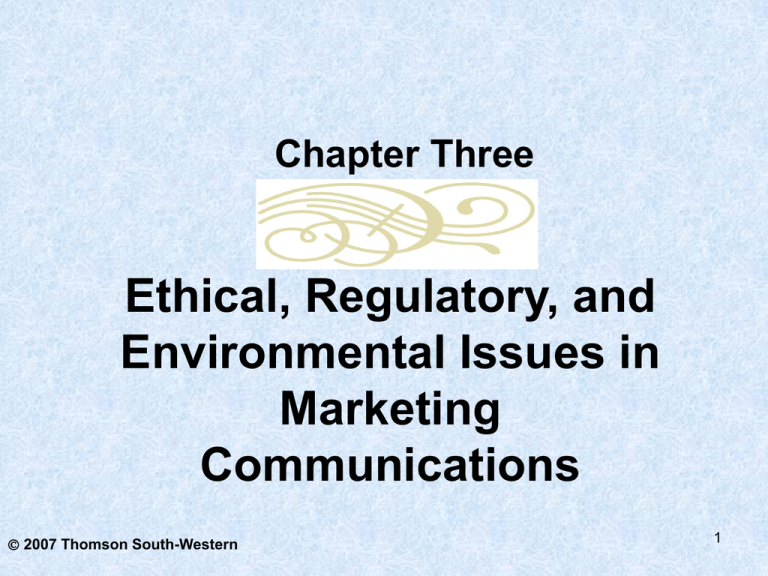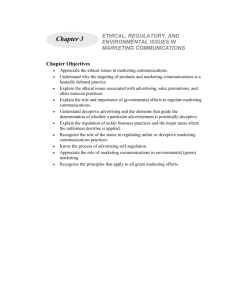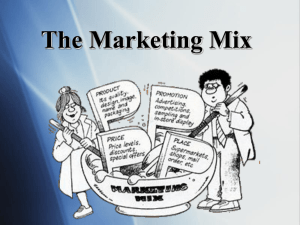Chapter Two Objectives
advertisement

Chapter Three Ethical, Regulatory, and Environmental Issues in Marketing Communications 2007 Thomson South-Western 1 Chapter Three Objectives • Appreciate the ethical issues in marketing communications. • Understand why the targeting of products and marketing communications is a heatedly debated practice. • Explore the ethical issues associated with advertising, sales promotions, and other marcom practices. 2 Chapter Three Objectives • Explain the role and importance of governmental efforts to regulate marketing communications. • Understand deceptive advertising and the elements that guide the determination of whether a particular advertisement is potentially deceptive. 3 Chapter Three Objectives • Explain the regulation of unfair business practices and the three major areas where the unfairness doctrine is applied. • Recognize the role of the states in regulating unfair or deceptive marketing communications practices. • Know the process of advertising selfregulation. 4 Chapter Three Objectives • Appreciate the role of marketing communications in environmental (green) marketing. • Recognize the principles that apply to all green marketing efforts. 5 Ethical issues in Marketing Communications Ethics in our context involves matters of right and wrong, or moral, conduct pertaining to any aspect of marketing communications 6 The Ethics of Targeting • Ethical debate—practice of targeting products and communications efforts to segments that, for various psychosocial and economic reasons, are vulnerable to marketing communications. 7 Targeting to Children and Teens • Products targeted to kids are unnecessary and the communications involved are exploitative • Use of posters, book covers, free magazines, advertising, and other so-called learning tools • Placing products in movies with tie-in merchandise programs 8 Targeting to Children and Teens • Targeting adult products to preadults—Miller Brewing Company— “bolder” beer • Use of unacceptable images—cartoons—greatest recent controversy is Joe Camel and Camel cigarettes • Marketing of adult-oriented entertainment products to children and teens: Violent films, video games, and music 9 Is Targeting Unethical or Just Good Marketing? Two arguments: • Targeting benefits rather than harms consumers—provide consumer with products best suited to their particular needs and wants • Concerned not with fulfilling consumers’ needs and wants, but rather with exploiting consumer vulnerabilities 10 AAAA Standards on Ethics in Advertising Sets lofty goals for the advertising industry and provides a framework for evaluating whether or not ads meet the high standards specified. 11 Ethical Issues in Public Relations • Publicity involves disseminating positive info about a company and its products and handling negative publicity • Like advertising—same ethical issues apply • The difference is negative publicity—firms confess to product shortcomings and acknowledge problems or, instead, attempt to cover up the problems 12 Ethical Issues in Packaging and Branding Four Aspects: 1) Label information 2) Packaging graphics 3) Packaging safety 4) Environmental implications 13 Ethical Issues in Sales Promotions • Sales promotions • Slotting allowances • Consumer-oriented sales promotions 14 Ethical Issues in Online Marketing • Overlap with ethics on advertising and promotions • Privacy is the most important ethical issue with online marketing • Invade individual’s privacy rights by selling information to other sources without the consumer’s consent 15 Fostering Ethical Marketing Communications The Golden Rule Act in a way that you would want The Professional Ethics Take only actions that would be viewed as proper by an objective panel of your professional colleagues The TV test “Would l feel comfortable explaining this action on television to the general public?” others to act toward you 16 When is Regulation Justified - Benefits • Consumer choice among alternatives is improved when consumers are better informed • Product quality tends to improve in response to consumers’ changing needs and preferences • Reduced prices resulting from a reduction in a seller’s “informational market power” 17 When is Regulation Justified - Costs • Companies incur the cost of complying with a regulatory remedy • Enforcement costs incurred by regulatory agencies and paid for by taxpayers • Unintended side effects result from regulations at a cost to both buyers and sellers 18 Regulation of Deceptive Advertising FTC will find a business practice deceptive “if there is a representation, omission or practice that is likely to mislead the consumer acting reasonably in the circumstances, to the consumer’s detriment.” 19 Elements of Deception • Misleading. • Reasonable consumer. • Material. 20 Regulation of Unfair Practices Three major areas 1. Offends public policy as it has been established by statutes 2. Is immoral, unethical, oppressive, or unscrupulous 3. Causes substantial injury to consumers, competitors, or other businesses. 21 Unfair Advertising Acts or practices that cause or are likely to cause substantial injury to consumers, which is not reasonably avoidable by consumers themselves and not outweighed by countervailing benefits to consumers or competition. 22 Information Regulation Corrective advertising A firm that misleads consumers should have to use future advertisements to rectify any deceptive impressions it has created in consumers’ minds 23 Regulation of Product Labeling Food and Drug Administration (FDA) – Responsible for regulating information on the packages of food and drug products – Responsible for regulating ads for prescription drugs – Requires advertisers to present a balanced perspective when advertising drugs 24 State Agencies’ Regulation of Marketing Communications • Most, if not all, states have departments of consumer affairs or consumer protection. • The National Association of Attorneys General (NAAG) - includes attorneys general from all 50 states 25 Advertising Self-Regulation Advertising Clearance Process 1. Advertising agency clearance 2. Approval from the advertiser’s legal department and perhaps also from an independent law firm 3. Media approval 26 The National Advertising Review Council Council of Better Business Bureaus’ National Advertising Review Council (NARC) Responsible for receiving or initiating, evaluating, investing, analyzing and holding initial negotiations with an advertiser on complaints or questions from any source involving truth or accuracy of national advertising. 27 Response to Environmental Problems Green advertising Packaging response Seal-of-Approval programs Cause-Oriented Programs Point-of-Purchase 28 Appropriate Environmental Claims • Make specific claims • Reflect current disposal options • Make substantive claims • Make supportable claims 29


